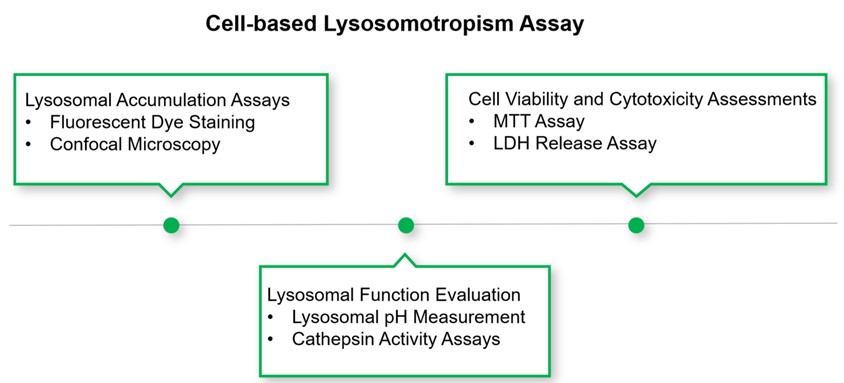Cell-based Lysosomotropism Assay Service
Discover Insights with Lysosomotropism Assay at Creative Biolabs
Creative Biolabs offers comprehensive in vitro absorption, distribution, metabolism, and excretion (ADME) services tailored specifically for cancer immunotherapy research.
The lysosome, a crucial organelle involved in cellular homeostasis, plays a significant role in drug delivery and toxicity. Compounds with lysosomotropic properties can accumulate within lysosomes, leading to alterations in lysosomal function and cellular responses. Understanding lysosomotropism is essential for assessing drug safety and efficacy, particularly in cancer immunotherapy, where precise drug targeting and minimal off-target effects are critical.
Creative Biolabs specializes in providing high-quality cell-based lysosomotropism assay services using H9c2 cells, which are derived from rat cardiomyocytes. This assay employs imaging techniques, specifically high content analysis (HCA), to measure fluorescence as the response parameter. With our expertise and state-of-the-art technologies, we offer a range of assays tailored to evaluate lysosomal accumulation and its impact on cellular function with precision and reliability. This comprehensive approach enables precise evaluation of cellular function and dynamics, providing valuable insights into various biological processes and compound interactions.

Our Lysosomotropism Assay Services Using H9c2
-
Lysosomal Accumulation Assays
-
Fluorescent Dye Staining: Employing lysosomotropic fluorescent dye, we assess compound accumulation within lysosomes of H9c2 cells, enabling visualization and quantification of lysosomal accumulation.
-
Confocal Microscopy: High-resolution imaging facilitates visualization and quantification of lysosomal accumulation within H9c2 cells, providing valuable insights into subcellular localization.
-
Lysosomal Function Evaluation
-
Lysosomal pH Measurement: Using pH-sensitive fluorescent probes, we monitor changes in lysosomal pH induced by compound accumulation in H9c2 cells, reflecting alterations in lysosomal function.
-
Cathepsin Activity Assays: Measurement of cathepsin activity in H9c2 cells allows for the assessment of lysosomal integrity and function upon compound exposure.
-
Cell Viability and Cytotoxicity Assessments
-
MTT Assay: We quantify cell viability of H9c2 cells following compound treatment using the MTT assay, providing insights into compound-induced cytotoxic effects associated with lysosomal accumulation.
-
LDH Release Assay: Measurement of lactate dehydrogenase (LDH) release from damaged H9c2 cells enables assessment of compound-induced cytotoxicity.
Applications
-
Drug Safety Evaluation: Assess lysosomal accumulation and associated cytotoxicity of compounds in H9c2 cells to identify potential safety concerns and optimize drug candidates.
-
Targeted Drug Delivery: Evaluate lysosomotropic properties of drug candidates for enhanced targeting of cancer cells in Cancer Immunotherapy using H9c2 cells.
-
Mechanistic Studies: Investigate mechanisms underlying lysosomal accumulation and its implications for cellular responses in H9c2 cells, facilitating the development of novel therapeutics.
Advantages
-
Our assays provide accurate and reproducible measurements of lysosomal accumulation and function in H9c2 cells, enabling robust data interpretation.
-
Tailored assay designs and flexible service options are available to meet the specific needs of research projects using H9c2 cells, ensuring optimal outcomes and data relevance.
-
Our assays offer comprehensive insights into lysosomal dynamics and compound-induced cytotoxicity in H9c2 cells, supporting informed decision-making in drug development and cancer immunotherapy.
Our cell-based lysosomotropism assay service using H9c2 cells offers a comprehensive solution for evaluating lysosomal accumulation and its impact on cellular function. Leveraging our expertise and cutting-edge technologies, we deliver precise and reliable data to support drug development and cancer immunotherapy research. Contact us today to leverage our tailored solutions and unlock valuable insights into lysosomal dynamics and compound safety.
For Research Use Only | Not For Clinical Use



 Download our brochure
Download our brochure